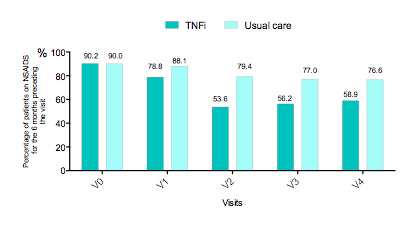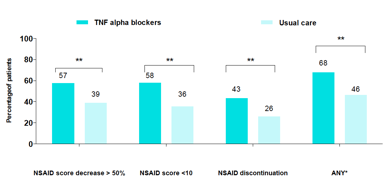Session Information
Session Type: Abstract Submissions (ACR)
Background/Purpose: Non-steroidal anti-inflammatory drugs (NSAIDs) are the keystone in the treatment of axial Spondyloarthritis (axSpA), but have potential side effects (cardiovascular and gastrointestinal). Effectiveness of TNF alpha inhibitors (TNFi) in early axial SpA has already been establishedbut the NSAID-sparing-effect of TNFi in real life has not been evaluated. The aim of this study was to evaluate the effect of TNFi on NSAID intake in an early axSpA cohort over the first 2 years of follow-up.
Methods: Study design: prospective, multi-centre, observational study (DESIR cohort) of patients with early inflammatory back pain; management and treatment of these patients was decided by their treating rheumatologists. Data of interest at each visit over 2 years: NSAID intake (yes/no) and ASAS-NSAID intake score. Statistical analysis: matching of patients receiving a TNFi or not by a propensity score; ANCOVA of the ASAS-NSAID intake score between groups over follow-up.
Results: Of the 627 patients followed-up, 181(28.9%) received a TNFi and were matched to 181 patients receiving usual care. Baseline characteristics were comparable (mean age 34 years and 40%males)NSAID-Sparing effect:Initially, 90.2% and 90.0% of patients received an NSAID (TNFi/usual care, respectively), with a greater decrease over time in the TNFi group (Figure1. The decrease in the median NSAID intake score was significantly greater in the TNFi group (from 54.9 to 1.9 vs. 41.9 to 22.3, p=0006), and the percentage of patients that could either decrease by 50% their NSAID intake or decrease their score under 10 or discontinuate NSAID treatment was greater in the TNFi group (67.6% vs 46.2%, p=0.002) (Figure2)
Conclusion: TNFi treatment is associated with a decrease in the proportion of patients taking NSAIDS, and even with a greater decrease in the overall intake of NSAIDs, confirming the NSAID-sparing effect of TNF alpha blockers in early axSpA in real life.

Disclosure:
A. Moltó,
None;
B. Granger,
None;
D. Wendling,
None;
M. A. Breban,
None;
M. Dougados,
None;
L. Gossec,
None.
« Back to 2014 ACR/ARHP Annual Meeting
ACR Meeting Abstracts - https://acrabstracts.org/abstract/do-tnf-alpha-inhibitors-have-an-nsaid-sparing-effect-in-real-life-in-early-axial-spa-results-from-the-desir-cohort/
